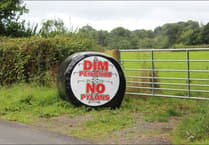An article in the Cambrian News on 125 opioid deaths in Wales in the year 2022/23 featured a headline with the words ‘Drug deaths’. The figures came from Public Health Wales (PHW). PHW also report 1,500 deaths on average each year in Wales due to alcohol consumption. They further state that 45 per cent of men and 34 per cent of women report drinking more than the suggested guidelines.
Why is it that drug use is so maligned? Reports on court cases in Llanelli and Aberystwyth suggest anyone caught driving with drugs in their system is automatically banned, drink driving attracts points plus fines, and only a ban if the driver is massively over the limit, mobile phone users seem to merely get a slap on the wrist. Yet in all cases drivers are not fully in control of a dangerous tonne of metal. The law should treat them equally, not equally leniently, but equally severely. Driving a car should only be done by people responsible enough to appreciate the consequences of their actions.
The war on drugs has been fought since the 1960’s. There is even a United Nations agreement dating back to that decade against any form of legalisation. Large drug busts only make temporary dents in supplies. It’s popular to lump all illegal drugs together, yet they vary hugely. So 125 people died in Wales due to opioids, whereas in the same year in the whole of England and Wales together only 26 deaths were attributed to cannabis use.
Many countries have approached the illegal drug problem in different ways. I grew up in the Netherlands and witnessed the use of a plethora of drugs. That country, seen by many as soft on drugs, has laws that are confusing and contradictory. It’s a mix of legalities and decriminalisation. Possession of cannabis is tolerated, legally sold in Coffee Shops, but growing cannabis on a large scale is prohibited and many are prosecuted. The Netherlands attracts many drug tourists, especially to Amsterdam, where instead of enjoying the canals, you’re treated to the smell of skunk at every corner. And the problem with heroin and cocaine hasn’t disappeared. The links to organised crime from people-smuggling to gun crime has to be acknowledged.
Germany is following suit but has learned lessons from its neighbour. They allow residents to grow small amounts of cannabis, reckoned to be used by 4 to 4.5 million Germans regularly. Germany also suffers a massive problem with harder drugs. They reported 2000 deaths due to crack cocaine and fentanyl in 2022. Fentanyl is a prescription drug but used illegally and often mixed with other drugs, it’s exceptionally dangerous. Heroin treatment centres in Germany and elsewhere are saving many lives.
Other examples are Uruguay and Canada. In Canada it is legal to grow cannabis. In the state of Oregon it is also legal to grow and possess cannabis but they have done a U-turn on decriminalising hard drugs. All these countries ignore the United Nations agreement.
We need a grown-up discussion on drug use. I’m no stranger to awful consequences; I lost a niece to suicide as a result of cocaine addiction. Lumping all drugs together as one big problem isn’t helpful. No sooner do the police crack down on one particular drug, then another, more dangerous one, rears its ugly head. The criminal justice system cannot solve the problem and our prisons are not the right places for most drug users.
First and foremost we should regard drug use as a health problem. Decriminalisation of cannabis is a start. But let’s also recognise the ‘acceptable’ drug, alcohol, for the troubles that it brings.
.jpg?trim=0,228,0,226&width=752&height=501&crop=752:501)




Comments
This article has no comments yet. Be the first to leave a comment.